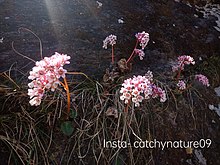Bergenia ciliata
| Bergenia ciliata | |
|---|---|

| |
| Scientific classification | |
| Kingdom: | Plantae |
| Clade: | Tracheophytes |
| Clade: | Angiosperms |
| Clade: | Eudicots |
| Order: | Saxifragales |
| Family: | Saxifragaceae |
| Genus: | Bergenia |
| Species: | B. ciliata
|
| Binomial name | |
| Bergenia ciliata | |
Bergenia ciliata (fringed elephant's ears,[1] winter begonia,[2] hairy bergenia,[3] Hindi & Sanskrit : Pashanbheda, पाषाणभेद)[4] is a plant species in the genus Bergenia, deciduous in USDA Zones 5 to 7, but usually remain semi-evergreen south of Zone 7.[2] It is found in Northern India in Uttarakhand (Chamoli and other districts of Uttarakhand) and Himachal Pradesh (in district Shimla). This flower is related to the famous Phool Dei Festival (https://www.tourmyindia.com/states/uttarakhand/phool-dei-festival.html) celebrated in Uttarakhand. It is commonly known in India as Pathar phor buti. Also found in mountain areas of West Bengal, like Kalimpong, and Darjeeling. Afghanistan, south Tibet, Northern Nepal, Bhutan (Haa and Mongar districts).

Bergenin, catechin, gallic acid,[5] gallicin, catechin-7-O-glucoside and β-sitosterol can be found in B. ciliata. It is known for its use in Ayurveda and other medicinal properties. It is mainly found on rocks and it grows in the month of February and March. It is a highly cited medicinal plant in the Himalayan state of Sikkim located in Northeastern India.[6]
The plant is harvested from the wild for use as a medicine and sometimes also for food.

References[edit]
- ^ The Royal Horticultural Society 2020
- ^ a b Botanical Garden: Bergenia ciliata
- ^ BSBI List 2007 (xls). Botanical Society of Britain and Ireland. Archived from the original (xls) on 2015-06-26. Retrieved 2014-10-17.
- ^ Controversial Drug Plants By R. Vasudevan Nair
- ^ Simultaneous quantification of bergenin, catechin, and gallic acid from Bergenia ciliata and Bergenia ligulata by using thin-layer chromatography. K. Dhalwal, V.M. Shinde, Y.S. Biradar and K.R. Mahadik, Journal of Food Composition and Analysis, Volume 21, Issue 6, September 2008, pp. 496-500, doi:10.1016/j.jfca.2008.02.008
- ^ O'Neill, Alexander; et al. (2017-03-29). "Integrating ethnobiological knowledge into biodiversity conservation in the Eastern Himalayas". Journal of Ethnobiology and Ethnomedicine. 13 (21): 21. doi:10.1186/s13002-017-0148-9. PMC 5372287. PMID 28356115.
Images[edit]

External links[edit]
 Data related to Bergenia ciliata at Wikispecies
Data related to Bergenia ciliata at Wikispecies Media related to Bergenia ciliata at Wikimedia Commons
Media related to Bergenia ciliata at Wikimedia Commons
